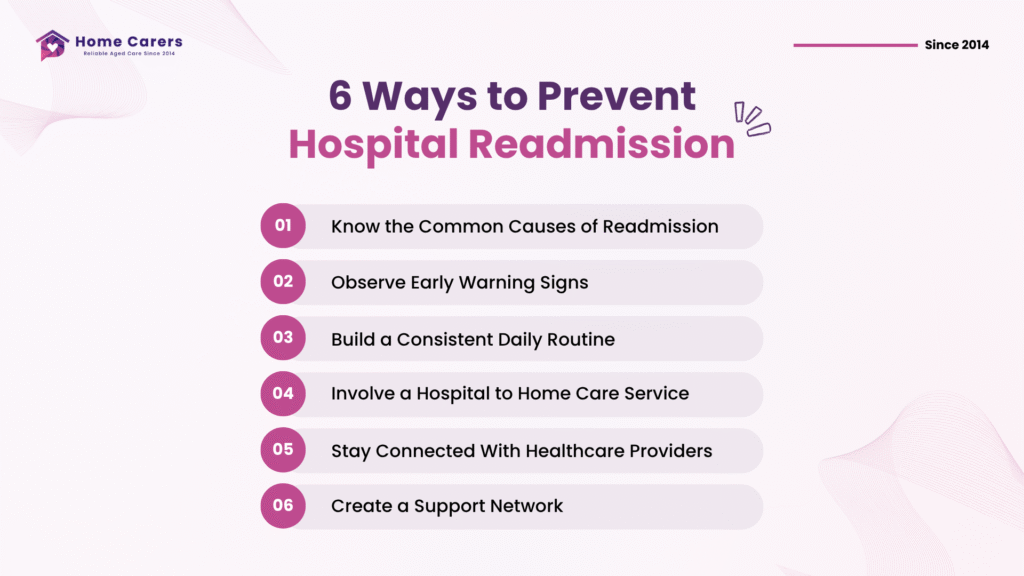Understanding Hospital Readmission
Returning home from hospital is a relief for most families — but for many older adults, it’s also a delicate phase where complications can quickly lead to readmission.
In New Zealand, hospital readmissions within 30 days are common among older patients, often caused by medication errors, falls, infections, or confusion after major treatment. The good news? Most of these setbacks are preventable with careful support and early observation.
By understanding what to look for and putting small systems in place, families can help their loved ones stay safe and confident at home — and avoid another stressful trip back to hospital.
How to Prevent Hospital Readmission at Home

1. Know the Common Causes of Readmission
Being proactive starts with knowing what can go wrong.
Some of the most frequent causes include:
- Medication mistakes — missed doses or double-dosing.
- Falls or mobility issues in the bathroom or bedroom.
- Infections from wounds or medical devices.
- Dehydration or poor nutrition in the first few days home.
- Lack of follow-up with doctors or specialists.
- Fatigue and confusion related to pain medication or anaesthetic recovery.
💡 Tip: Keep the discharge summary visible and update it with new medications or appointments to avoid confusion later.
2. Observe Early Warning Signs
Small changes can signal something more serious. Families should monitor:
- Rising temperature or chills (possible infection)
- Unusual sleepiness or confusion
- Difficulty breathing, swelling, or pain
- Refusal to eat or drink
- Missed medication or new side effects
Encourage your loved one to share how they feel each day — many issues appear subtle at first.
If something doesn’t seem right, call your GP, nurse, or Healthline (0800 611 116) for advice before it becomes an emergency.
3. Build a Consistent Daily Routine
Predictability helps older adults regain strength and confidence.
Simple routines — such as regular meals, hydration, short walks, and rest times — keep recovery stable.
A structured day might include:
- Morning: medication and breakfast
- Midday: short movement or rest
- Afternoon: light meal and hydration
- Evening: medication, hygiene, and winding down
Home-based carers can make this easier by keeping things on track — especially when family members live far away or work full time.
4. Involve a Hospital to Home Care Service
Even when families are well-prepared, recovery can be unpredictable. That’s where professional Hospital to Home Care makes a significant impact.
Home Carers’s qualified team helps bridge the gap between hospital discharge and full recovery by:
- Organising safe transport home from hospital.
- Managing medication reminders and hydration.
- Monitoring comfort, wounds, or swelling.
- Assisting with mobility to reduce fall risk.
- Providing companionship to ease loneliness and anxiety.
When the right support is in place, families can focus on quality time — not constant worry.
5. Stay Connected With Healthcare Providers
Follow-up communication is key to avoiding complications.
Make sure you:
- Confirm all GP and specialist appointments.
- Keep contact numbers for after-hours advice handy.
- Update your GP about any new medication prescribed at hospital.
- Ask about community nursing or rehabilitation options if needed.
💡 Tip: Bring a written list of questions to each follow-up appointment to avoid confusion or gaps in care.
6. Create a Support Network
Recovery at home works best when everyone is involved.
Even if family can’t visit daily, neighbours, friends, or local carers can check in.
For those needing extra reassurance, pairing Hospital to Home support with Wellness Checks ensures continuous observation without intruding on independence.
Small Steps, Big Difference

Avoiding hospital readmission isn’t just about medical care — it’s about planning, observation, and connection.
By staying attentive, keeping routines simple, and asking for help early, families can create the safest possible environment for recovery.
Every small effort counts toward a stronger, more confident return to independence.


